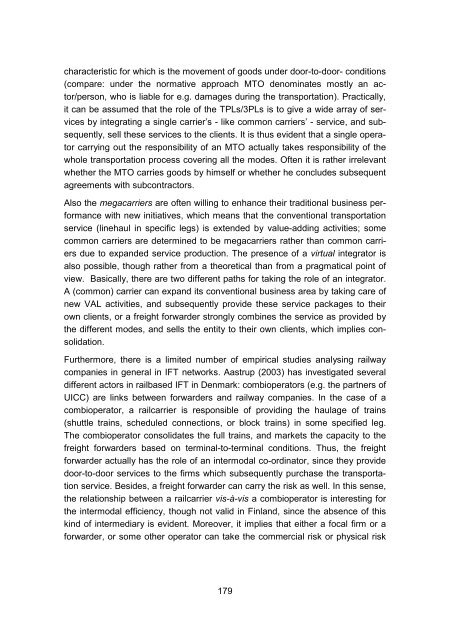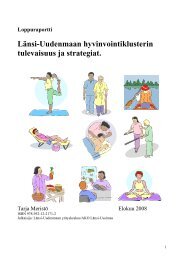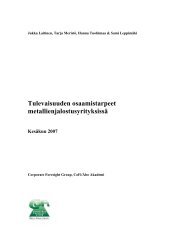849954 sisus
849954 sisus
849954 sisus
You also want an ePaper? Increase the reach of your titles
YUMPU automatically turns print PDFs into web optimized ePapers that Google loves.
characteristic for which is the movement of goods under door-to-door- conditions<br />
(compare: under the normative approach MTO denominates mostly an actor/person,<br />
who is liable for e.g. damages during the transportation). Practically,<br />
it can be assumed that the role of the TPLs/3PLs is to give a wide array of services<br />
by integrating a single carrier’s - like common carriers’ - service, and subsequently,<br />
sell these services to the clients. It is thus evident that a single operator<br />
carrying out the responsibility of an MTO actually takes responsibility of the<br />
whole transportation process covering all the modes. Often it is rather irrelevant<br />
whether the MTO carries goods by himself or whether he concludes subsequent<br />
agreements with subcontractors.<br />
Also the megacarriers are often willing to enhance their traditional business performance<br />
with new initiatives, which means that the conventional transportation<br />
service (linehaul in specific legs) is extended by value-adding activities; some<br />
common carriers are determined to be megacarriers rather than common carriers<br />
due to expanded service production. The presence of a virtual integrator is<br />
also possible, though rather from a theoretical than from a pragmatical point of<br />
view. Basically, there are two different paths for taking the role of an integrator.<br />
A (common) carrier can expand its conventional business area by taking care of<br />
new VAL activities, and subsequently provide these service packages to their<br />
own clients, or a freight forwarder strongly combines the service as provided by<br />
the different modes, and sells the entity to their own clients, which implies consolidation.<br />
Furthermore, there is a limited number of empirical studies analysing railway<br />
companies in general in IFT networks. Aastrup (2003) has investigated several<br />
different actors in railbased IFT in Denmark: combioperators (e.g. the partners of<br />
UICC) are links between forwarders and railway companies. In the case of a<br />
combioperator, a railcarrier is responsible of providing the haulage of trains<br />
(shuttle trains, scheduled connections, or block trains) in some specified leg.<br />
The combioperator consolidates the full trains, and markets the capacity to the<br />
freight forwarders based on terminal-to-terminal conditions. Thus, the freight<br />
forwarder actually has the role of an intermodal co-ordinator, since they provide<br />
door-to-door services to the firms which subsequently purchase the transportation<br />
service. Besides, a freight forwarder can carry the risk as well. In this sense,<br />
the relationship between a railcarrier vis-à-vis a combioperator is interesting for<br />
the intermodal efficiency, though not valid in Finland, since the absence of this<br />
kind of intermediary is evident. Moreover, it implies that either a focal firm or a<br />
forwarder, or some other operator can take the commercial risk or physical risk<br />
179








